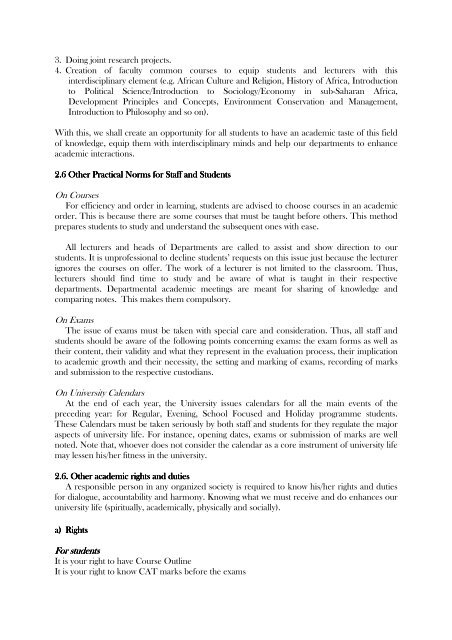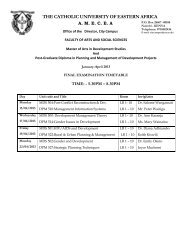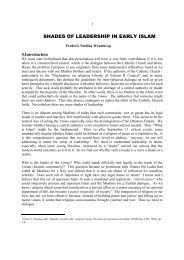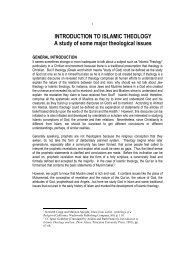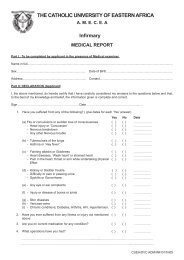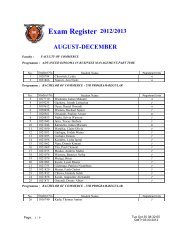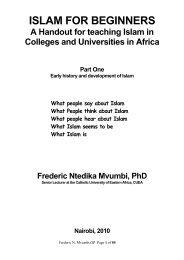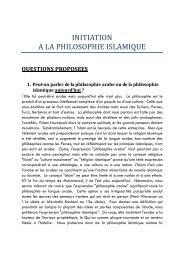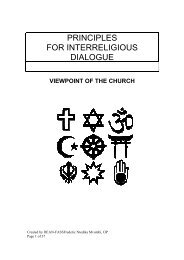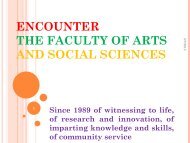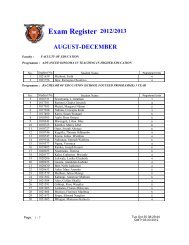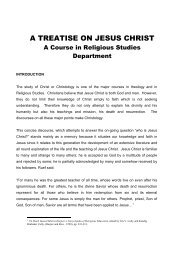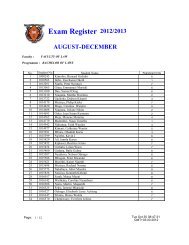FASSC PROFILE.pdf - CUEA
FASSC PROFILE.pdf - CUEA
FASSC PROFILE.pdf - CUEA
Create successful ePaper yourself
Turn your PDF publications into a flip-book with our unique Google optimized e-Paper software.
3. Doing joint research projects.<br />
4. Creation of faculty common courses to equip students and lecturers with this<br />
interdisciplinary element (e.g. African Culture and Religion, History of Africa, Introduction<br />
to Political Science/Introduction to Sociology/Economy in sub-Saharan Africa,<br />
Development Principles and Concepts, Environment Conservation and Management,<br />
Introduction to Philosophy and so on).<br />
With this, we shall create an opportunity for all students to have an academic taste of this field<br />
of knowledge, equip them with interdisciplinary minds and help our departments to enhance<br />
academic interactions.<br />
2.6 Other Practical<br />
Norms for Staff and Students<br />
On Courses<br />
For efficiency and order in learning, students are advised to choose courses in an academic<br />
order. This is because there are some courses that must be taught before others. This method<br />
prepares students to study and understand the subsequent ones with ease.<br />
All lecturers and heads of Departments are called to assist and show direction to our<br />
students. It is unprofessional to decline students’ requests on this issue just because the lecturer<br />
ignores the courses on offer. The work of a lecturer is not limited to the classroom. Thus,<br />
lecturers should find time to study and be aware of what is taught in their respective<br />
departments. Departmental academic meetings are meant for sharing of knowledge and<br />
comparing notes. This makes them compulsory.<br />
On Exams<br />
The issue of exams must be taken with special care and consideration. Thus, all staff and<br />
students should be aware of the following points concerning exams: the exam forms as well as<br />
their content, their validity and what they represent in the evaluation process, their implication<br />
to academic growth and their necessity, the setting and marking of exams, recording of marks<br />
and submission to the respective custodians.<br />
On University Calendars<br />
At the end of each year, the University issues calendars for all the main events of the<br />
preceding year: for Regular, Evening, School Focused and Holiday programme students.<br />
These Calendars must be taken seriously by both staff and students for they regulate the major<br />
aspects of university life. For instance, opening dates, exams or submission of marks are well<br />
noted. Note that, whoever does not consider the calendar as a core instrument of university life<br />
may lessen his/her fitness in the university.<br />
2.6. Other academic rights and duties<br />
A responsible person in any organized society is required to know his/her rights and duties<br />
for dialogue, accountability and harmony. Knowing what we must receive and do enhances our<br />
university life (spiritually, academically, physically and socially).<br />
a) Rights<br />
For students<br />
It is your right to have Course Outline<br />
It is your right to know CAT marks before the exams


